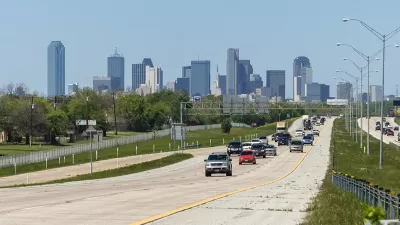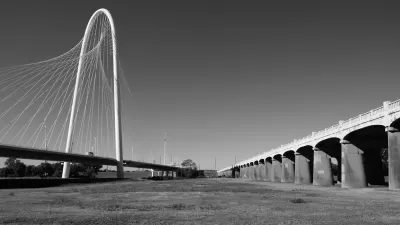Mark Lamster has eviscerated the city of Dallas for its plans to build the Trinity Toll Road before—and he'll probably do it again.
Mark Lamster, architecture critic for The Dallas Morning News, describes his befuddlement with the latest developments in the saga of the Trinity River project:
Only in Dallas would you design a highway in a park, and only in Dallas would you design a highway in a park before designing the park itself. Or even developing a general concept of that park, much less creating an authority that might actually be charged with building and paying for it.
That planning context explains, according to Lamster, why the project "has been meandering along for the better part of two decades with no tangible result beyond an endless series of conflicting reports, studies, and briefing documents."
Lamster casts doubt on the idea that the "Dream Team" that released its report for the Trinity Toll Road earlier this week cleared any of the hurdles that have plagued the project during its history. Moreover, writes Lamster, "[t]here is a good argument that the dream team should never have been convened in the first place, that it was conceived and paid for by toll-road proponents to give intellectual cover for the plan to drive a high-capacity toll road through the Trinity…"
The remainder of the column details the back-and-froth between Dream Team members and city councilmembers during the recent public hearing on the report, and also illustrates how the project exemplifies "Dallas Logic," as Lamster describes it. "Dallas Logic" resembles the "Paradox City" formulation Lamster created in 2014 in reaction to an earlier moment in the debate surrounding the Trinity Toll Road and Trinity River project.
FULL STORY: ‘Dallas Logic.’ Or, why the Trinity Project is forever stalled

Alabama: Trump Terminates Settlements for Black Communities Harmed By Raw Sewage
Trump deemed the landmark civil rights agreement “illegal DEI and environmental justice policy.”

Study: Maui’s Plan to Convert Vacation Rentals to Long-Term Housing Could Cause Nearly $1 Billion Economic Loss
The plan would reduce visitor accommodation by 25% resulting in 1,900 jobs lost.

Why Should We Subsidize Public Transportation?
Many public transit agencies face financial stress due to rising costs, declining fare revenue, and declining subsidies. Transit advocates must provide a strong business case for increasing public transit funding.

Paris Bike Boom Leads to Steep Drop in Air Pollution
The French city’s air quality has improved dramatically in the past 20 years, coinciding with a growth in cycling.

Why Housing Costs More to Build in California Than in Texas
Hard costs like labor and materials combined with ‘soft’ costs such as permitting make building in the San Francisco Bay Area almost three times as costly as in Texas cities.

San Diego County Sees a Rise in Urban Coyotes
San Diego County experiences a rise in urban coyotes, as sightings become prevalent throughout its urban neighbourhoods and surrounding areas.
Urban Design for Planners 1: Software Tools
This six-course series explores essential urban design concepts using open source software and equips planners with the tools they need to participate fully in the urban design process.
Planning for Universal Design
Learn the tools for implementing Universal Design in planning regulations.
Smith Gee Studio
Alamo Area Metropolitan Planning Organization
City of Santa Clarita
Institute for Housing and Urban Development Studies (IHS)
City of Grandview
Harvard GSD Executive Education
Toledo-Lucas County Plan Commissions
Salt Lake City
NYU Wagner Graduate School of Public Service




























